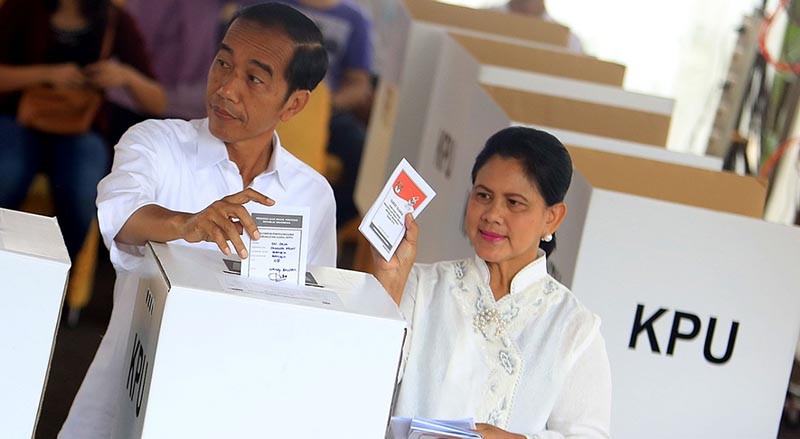[Analytics] Secular politics poised to prevail over conservatism in Indonesian general elections

Incumbent Joko "Jokowi" Widodo and First Lady Iriana cast their ballots in Central Jakarta on Wednesday. (The Jakarta Post/Seto Wardhana)
In the world’s largest single-day elections on April 17, Indonesians voted to elect the president, vice president and members of the People’s Consultative Assembly. Over 190 million eligible voters cast their votes amid an undercurrent of conservatism in the Muslim-majority nation. Ge Hongliang specially for the Global Times.
Although official election results will be announced on May 22, private pollsters estimated that incumbent President Joko Widodo won about 55 percent of the ballots cast, outdoing his rival Prabowo Subianto by almost 10 percentage points.
In recent years, conservatism has emerged as the most prominent feature of Indonesian politics. The 2017 Jakarta gubernatorial election is the most important example of the growing trend of conservatism. Anies Baswedan won the race in 2017 as identity politics was played. Baswedan’s rival Basuki Tjahaja Purnama, who is Jakarta’s former governor and also an ethnic Chinese Christian, was found guilty of blasphemy, and ended up getting 18 percent less votes than Baswedan. The conservative leader’s victory propped up the role of religious and identity politics in the 2017 Jakarta gubernatorial election. The emergence of the politics of religion in the garb of conservatism during Jakarta’s gubernatorial election triggered concern. People worried that extreme religious ideology and use of identity politics will mar the general elections, hurt Indonesia’s political environment and stymie the development of secular politics.
Two years hence, conservatism has come to haunt Indonesia’s general elections. Widodo’s identity has been repeatedly attacked. The rumor mill has it that he is a Chinese-Indonesian and Communist.
Besides, religion also played a role in the choice of candidates in the general elections. Widodo was nominated by the Indonesian Democratic Party of Struggle and its partisan allies. He chose Ma’ruf Amin, the country’s top Muslim cleric and chairman of the Indonesian Ulema Council, to be his running mate. The choice was obviously based on the growing influence of religion and conservatism in Indonesia’s polity.
Many large-scale gatherings and demonstrations have taken place in Jakarta since 2017. Subianto has raised the slogan of “Indonesia First” during his second contest with Widodo.During the campaign, Subianto used nationalism to blame the Widodo administration’s foreign and economic policies.
However, extreme religious fringe wasn’t able to make a dent in the 2019 general elections. Basedan defeated rival Purnama but Subianto failed to dethrone Widodo using the same technique. In addition to the failure of identity politics and people’s fear of extremism and conservatism, Widodo’s political achievements and popularity are the main causes of his popular support. Voters seem to have chosen him for his achievements and character.
In fact, this is the rationale behind development of secular politics and also Indonesian state philosophy. Thus, the 2019 general elections are also a test of how Indonesian people treat the country’s official, foundational philosophy of “Pancasila” – belief in the one and only God, a just and civilized humanity, a unified Indonesia, democracy led by the wisdom of the people’s representatives, and social justice for all Indonesians. Indeed, the failure of conservatism does not mean that it has disappeared. Instead, it is still present in Indonesia’s politics. The Widodo administration still needs to deal with extreme religious thought and conservatism in the future.
The author is a senior researcher at The Charhar Institute and director of the Institute of Malaysian Studies at Guangxi University for Nationalities.